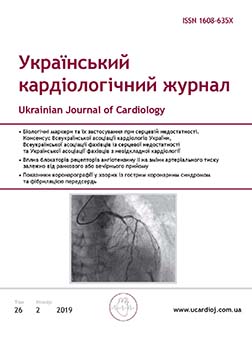Heart failure requiring hospitalization in patients after cardiac surgery for valvular heart disease
Main Article Content
Abstract
The aim – to determine the factors associated with the frequency of hospitalizations for decompensation of heart failure (HF) after cardiac surgery in patients with valvular heart disease.
Materials and methods. 235 patients who underwent cardiac surgery for valvular heart disease were examined. During the period from 2014 to 2017, a part of patients (129 people) had no hospitalizations, while 106 people were on inpatient treatment from 1 to 10 times, on average 2.78±1.95. The complex of examination of patients along with physical examination included electrocardiography, echocardiography.
Results and discussion. During dynamic observation for 2 years in the group of patients without hospitalization, a progressive statistically significant decrease in the size of the left atrium (LA) and left ventricle (LV) as well as an increase in LV contractility were noted, while in the group of patients after hospitalization such changes were not observed. The dimensions of the chambers of the heart remained practically unchanged for 2 years. Thus, it can be concluded that the more severe course of heart failure after prosthetics of heart valves is accompanied by the absence of reverse remodeling of the heart chambers. Predictors of hospitalizations for HF are the presence of diabetes mellitus, hypertension and permanent form of atrial fibrillation.
Conclusions. The probability of progression of heart failure in patients after cardiosurgical intervention for valvular heart pathology is not affected by sex, age, type of lesion of the valve, etiology of valve damage, indicators of echocardiography. Predictors of hospitalizations for heart faiure in the long-term postoperative period are the presence of diabetes, AF, and AH. The more severe course of heart failure after prosthetics of heart valves is accompanied by the absence of reverse remodeling of the heart chambers.
Article Details
Keywords:
References
Calleja AM, Dommaraju S, Gaddam R et al. Cardiac risk in patients aged >75 years with asymptomatic, severe aortic stenosis undergoing noncardiac surgery. Am. J Cardiol. 2010;105:1159–1163. https://doi.org/10.3410/f.3131957.2816055
Elder DH1, Wei L, Szwejkowski BR, Libianto R, Nadir A, Pauriah M, Rekhraj S, Lim TK, George J, Doney A, Pringle SD, Choy AM, Struthers AD, Lang CC. The impact of renin-angiotensin-aldosterone system blockade on heart failure outcomes and mortality in patients identified to have aortic regurgitation: a large population cohort study. J Am. Coll. Cardiol. 2011;58:2084–2091. doi.org/10.1016/j.ycar.2012.01.108
Lancellotti P, Gerard PL, Pierard LA. Long-term outcome of patients with heart failure and dynamic functional mitral regurgitation. Eur Heart J 2005;26:1528–1532. https://doi.org/10.1093/eurheartj/ehi189
McNeely C, Telila T, Markwell S, Hazelrigg S, Vassileva CM. Hospital Readmission after Aortic Valve Replacement: Impact of Preoperative Heart Failure. J Heart Valve Dis. 2016 Jul;25(4):430–436.
Tashiro T, Pislaru SV, Blustin JM, Nkomo VT, Abel MD, Scott CG, Pellikka PA. Perioperative risk of major non-cardiac surgery in patients with severe aortic stenosis: a reappraisal in contemporary practice. Eur Heart J 2014;35:2372–2381. https://doi.org/10.1093/eurheartj/ehu044
Vassileva CM, Ghazanfari N, Spertus J, McNeely C, Markwell S, Hazelrigg S. Heart Failure Readmission After Mitral Valve Repair and Replacement: Five-Year Follow-Up in the Medicare Population. Ann Thorac Surg 2014;98:1544–50. https://doi.org/10.1016/j.athoracsur.2014.07.040

